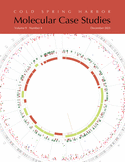Whole-genome sequencing of a malignant granular cell tumor with metabolic response to pazopanib
- Lei Wei1,10,
- Song Liu1,10,
- Jeffrey Conroy2,10,
- Jianmin Wang1,10,
- Antonios Papanicolau-Sengos2,10,
- Sean T. Glenn3,
- Mitsuko Murakami2,
- Lu Liu2,
- Qiang Hu1,
- Jacob Conroy2,
- Kiersten Marie Miles2,
- David E. Nowak2,
- Biao Liu2,
- Maochun Qin1,
- Wiam Bshara5,
- Angela R. Omilian5,
- Karen Head5,
- Michael Bianchi2,
- Blake Burgher2,
- Christopher Darlak2,
- John Kane7,
- Mihai Merzianu5,
- Richard Cheney5,
- Andrew Fabiano6,
- Kilian Salerno7,
- Chetasi Talati4,
- Nikhil I. Khushalani4,
- Donald L. Trump4,9,
- Candace S. Johnson8 and
- Carl D. Morrison2
- 1Department of Biostatistics and Bioinformatics, Roswell Park Cancer Institute, Buffalo, New York 14263, USA;
- 2Center for Personalized Medicine, Roswell Park Cancer Institute, Buffalo, New York 14263, USA;
- 3Department of Cancer Genetics, Roswell Park Cancer Institute, Buffalo, New York 14263, USA;
- 4Department of Medicine, Roswell Park Cancer Institute, Buffalo, New York 14263, USA;
- 5Department of Pathology, Roswell Park Cancer Institute, Buffalo, New York 14263, USA;
- 6Department of Surgery, Roswell Park Cancer Institute, Buffalo, New York 14263, USA;
- 7Department of Radiation Oncology, Roswell Park Cancer Institute, Buffalo, New York 14263, USA;
- 8Department of Pharmacology and Therapeutics, Roswell Park Cancer Institute, Buffalo, New York 14263, USA;
- 9Inova Dwight and Martha Schar Cancer Institute, Falls Church, Virginia 22042, USA
- Corresponding author: Carl.Morrison{at}RoswellPark.Org
-
↵10 These authors contributed equally to this work.
Abstract
Granular cell tumors are an uncommon soft tissue neoplasm. Malignant granular cell tumors comprise <2% of all granular cell tumors, are associated with aggressive behavior and poor clinical outcome, and are poorly understood in terms of tumor etiology and systematic treatment. Because of its rarity, the genetic basis of malignant granular cell tumor remains unknown. We performed whole-genome sequencing of one malignant granular cell tumor with metabolic response to pazopanib. This tumor exhibited a very low mutation rate and an overall stable genome with local complex rearrangements. The mutation signature was dominated by C>T transitions, particularly when immediately preceded by a 5′ G. A loss-of-function mutation was detected in a newly recognized tumor suppressor candidate, BRD7. No mutations were found in known targets of pazopanib. However, we identified a receptor tyrosine kinase pathway mutation in GFRA2 that warrants further evaluation. To the best of our knowledge, this is only the second reported case of a malignant granular cell tumor exhibiting a response to pazopanib, and the first whole-genome sequencing of this uncommon tumor type. The findings provide insight into the genetic basis of malignant granular cell tumors and identify potential targets for further investigation.
Footnotes
-
[Supplemental material is available for this article.]
- Received April 8, 2015.
- Accepted July 24, 2015.
This article is distributed under the terms of the Creative Commons Attribution-NonCommercial License, which permits reuse and redistribution, except for commercial purposes, provided that the original author and source are credited.









